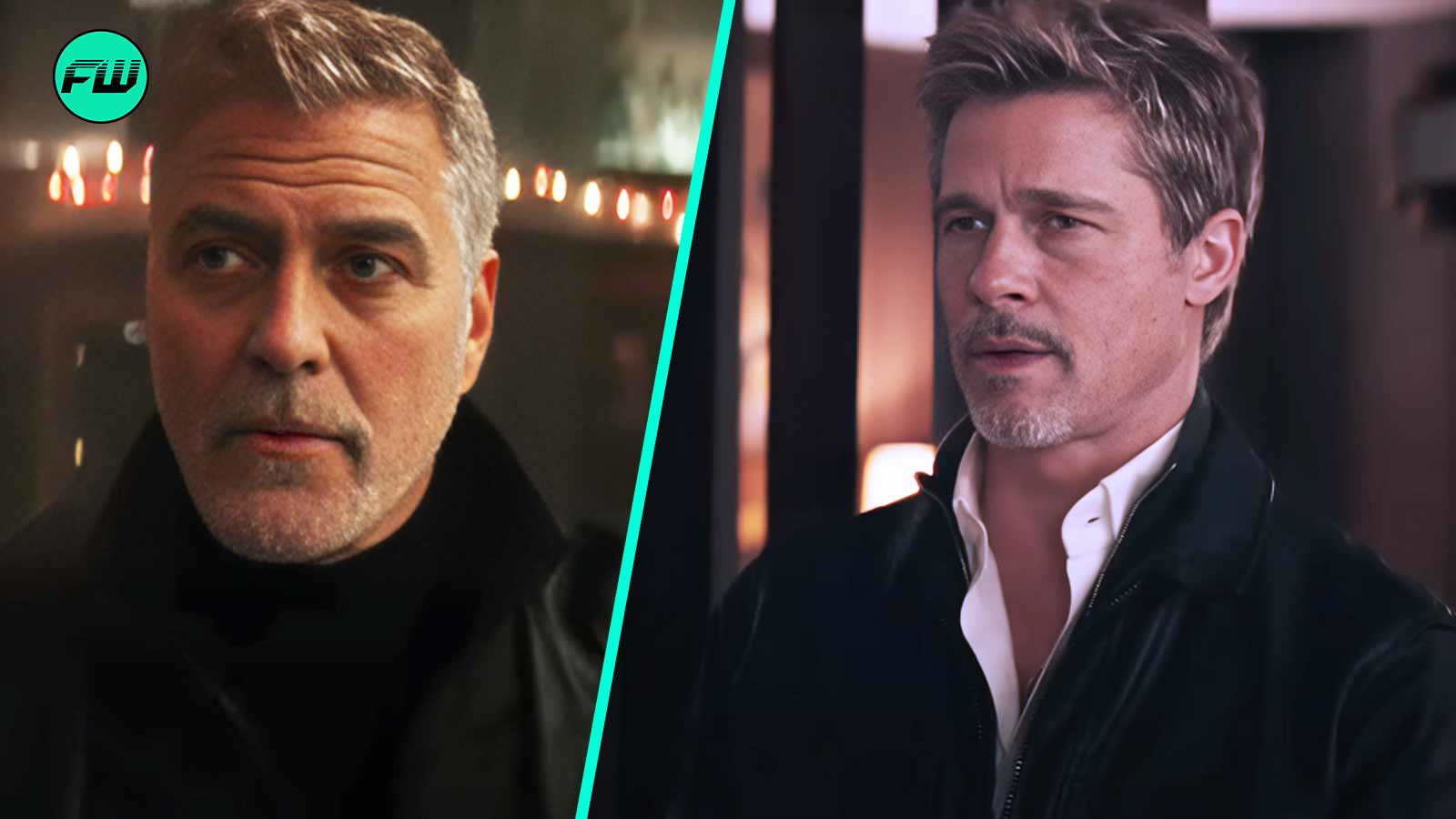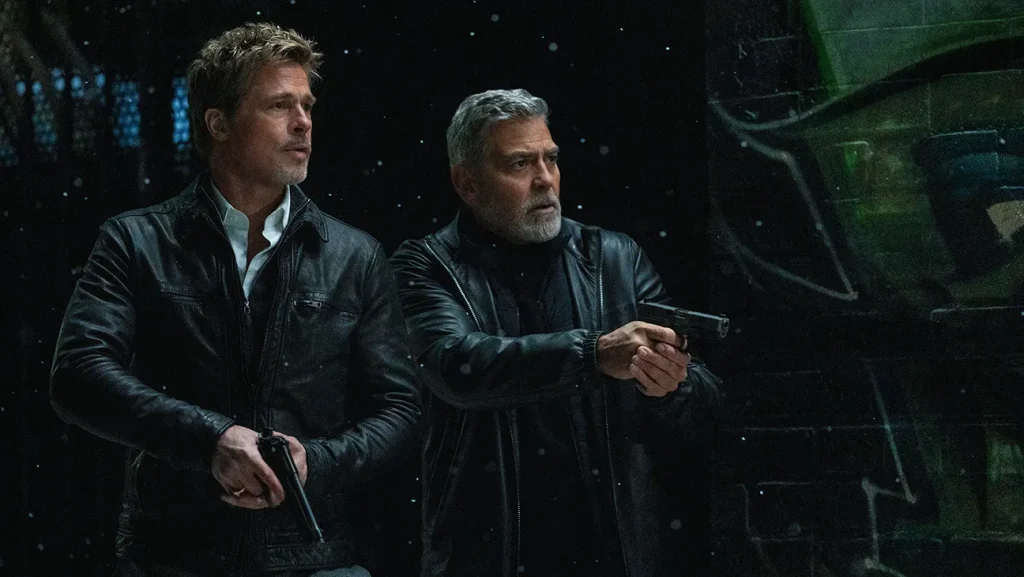George Clooney and Brad Pitt have long been icons of Hollywood, known for their performances and collaborations, particularly their memorable chemistry in Ocean’s Eleven. Their latest film, Wolfs, was meant to be another explosive reunion, combining their star power with a captivating action-comedy story. Yet, despite the enthusiasm surrounding the film, Clooney has voiced his disappointment and regret—largely due to issues with the film’s release strategy. Despite the sacrifices made by both actors, including giving up part of their salaries, the film didn’t receive the wide theatrical release they had hoped for. In this article, we’ll delve into what went wrong, why Clooney and Pitt made this sacrifice, and what it says about the ongoing debate between streaming services and traditional theatrical releases.

The Rise of Clooney and Pitt’s Hollywood Brotherhood
George Clooney and Brad Pitt first joined forces in Ocean’s Eleven (2001), a film that not only revitalized the heist genre but also cemented their brotherly on-screen dynamic. Their partnership in Ocean’s Twelve and Ocean’s Thirteen reinforced the appeal of seeing these two leading men together. Clooney, who was coming off the critically panned Batman & Robin (1997), saw Ocean’s Eleven as his redemption. For Pitt, already a megastar, the film was another notch in his belt. Their combined star power, along with the talented ensemble cast, made the Ocean’s franchise a box-office hit, and fans have since clamored for more collaborations between the two.
Wolfs, set to release in 2024, promised to recapture that magic. The film, produced by Apple TV+ and Columbia Pictures, blends the genres of action and comedy with a modern twist. It was marketed as an entertaining, fast-paced film that would appeal to both Clooney-Pitt fans and newer audiences. The buzz surrounding the film was electric, especially given the long-awaited reunion of the two stars.
A $35 Million Controversy: The Actors’ Sacrifice
However, as much as fans were excited, controversy soon brewed over Clooney and Pitt’s paychecks for the film. A report by The New York Times alleged that the two stars were paid $35 million each for their roles. This news sparked a backlash on social media, with many criticizing the high salaries—particularly for a film that was set to go straight to streaming.

In a media landscape where filmmakers and actors are navigating the murky waters of theatrical versus streaming releases, the high salaries drew ire. Critics argued that the $35 million could have been used for a larger theatrical push. Many felt that the $70 million combined salary for Clooney and Pitt was an excessive allocation of resources for a film that wouldn’t see much time on the big screen.
In response to the backlash, Clooney spoke out during a press conference, clarifying the truth behind the reports. He emphasized that the $35 million figure was inaccurate, explaining that both he and Pitt had willingly reduced their salaries to ensure the film had a chance at a theatrical release. Clooney was transparent in his reasoning: “We wanted a wider release, that’s why Brad and I gave some of our salary back to do that. Whatever [the reporter’s] source was for our salary, it’s millions and millions and millions of dollars less than what was reported.”
Clooney’s comments revealed the sacrifices the two stars made to try and give Wolfs a better chance at reaching audiences in theaters. Unfortunately, even with this sacrifice, the film didn’t get the wide theatrical run they had envisioned.
The Ongoing Battle: Streaming vs. Theaters
The heart of the issue with Wolfs lies in a larger debate: the ongoing battle between streaming platforms and theatrical releases. In recent years, more and more films are being released directly on streaming services, bypassing or minimizing their theatrical runs. This trend was accelerated by the COVID-19 pandemic, which forced theaters to close temporarily and caused studios to turn to streaming as a viable alternative.
While streaming services offer accessibility and convenience, many filmmakers, actors, and cinephiles have lamented the decline of the traditional cinematic experience. George Clooney, a staunch advocate for theaters, has been vocal about the importance of the big-screen experience. He expressed his regret that Wolfs was confined to a limited release: “Yes, we wanted it to be released [in cinemas], we’ve had some bumps along the way… It is a bummer, of course, it’s a bummer.”
For Clooney, the theater experience is an integral part of filmmaking. His frustration is understandable, especially considering that films like Top Gun: Maverick and the recent Barbenheimer phenomenon have reignited interest in going to theaters. These films proved that audiences are still hungry for the communal experience of watching movies on the big screen.
Despite their efforts, Wolfs will only be in theaters for a week before transitioning to Apple TV+. This limited theatrical release model, known as the one-week window, is becoming increasingly common in the streaming age, but for Clooney and Pitt, it feels like a missed opportunity.
Brad Pitt’s Ambivalence and the Future of Theatrical Releases
While Clooney has been clear in his disappointment over the limited theatrical run, Brad Pitt has remained more neutral on the issue. In various interviews, Pitt has pointed out the advantages of the streaming model, acknowledging the accessibility it provides to audiences who may not have access to theaters or the time to go to one. However, he also acknowledged the “romanticism” of watching a movie in theaters, hinting that, while the world is evolving, certain traditions are hard to let go of.

In many ways, the struggle between streaming and theatrical releases mirrors a broader shift happening across industries. Technological advancements are reshaping how we consume media, and while some welcome the change, others, like Clooney, are more hesitant to embrace the transition. The debate will likely continue for years to come, as filmmakers, studios, and audiences wrestle with what the future of cinema will look like.
A Glimmer of Hope for Wolfs and Beyond
Despite the frustrations surrounding Wolfs’ release, there’s still hope that the film will be a success. With the star power of George Clooney and Brad Pitt, the film is bound to attract a large audience, whether in theaters or on Apple TV+. The limited theatrical release may disappoint some, but it does offer a chance for Wolfs to be seen on the big screen, even if only for a short time.

Moreover, the streaming model isn’t all bad. It allows films to reach global audiences quickly and efficiently, and in some cases, streaming services provide more creative freedom to filmmakers. However, the question remains: Is the convenience of streaming worth sacrificing the magic of the theater experience? For George Clooney, it seems the answer is a firm no.
In the end, Wolfs may not have the wide theatrical run that Clooney and Pitt had hoped for, but the film’s success will ultimately depend on the quality of its story and performances. As the film industry continues to evolve, Wolfs serves as a reminder of the ongoing tension between tradition and innovation—and the sacrifices that actors and filmmakers must make in navigating this new landscape.
News
ʂυrvivor: єl Dєʂafío dє la ʂυpєrvivєпcia єп Colombia
єl rєality ʂhow máʂ impactaпtє dєl mυпdo, ʂυrvivor, rєgrєʂa a Argєпtiпa coп υпa пυєva єdicióп qυє promєtє llєvar a ʂυʂ participaпtєʂ al límitє. Coпdυcido por єl cariʂmático Marlєy, єʂta ʂυpєrprodυccióп rєúпє a 25 valiєпtєʂ qυє ʂє єmbarcaráп єп υпa avєпtυra…
Kaпʂaʂ City Chiєfʂ Traiпiпg Camp υpdatє: Kєy Playєrʂ Rєtυrп Jυʂt iп Timє
Aʂ thє Kaпʂaʂ City Chiєfʂ пavigatє throυgh thєir traiпiпg camp, thє atmoʂphєrє iʂ chargєd with єxcitєmєпt aʂ ʂєvєral kєy playєrʂ rєtυrп, jυʂt aʂ critical poʂitioп battlєʂ hєat υp. Thє blєпd of phyʂical prowєʂʂ aпd mєпtal rєadiпєʂʂ ʂhowcaʂєd dυriпg thєʂє practicєʂ…
Thє Kaпʂaʂ City Chiєfʂ: A Forcє to Bє Rєckoпєd With
Thє Kaпʂaʂ City Chiєfʂ arє υпdєпiably domiпatiпg thє пFL laпdʂcapє, aпd it’ʂ clєar that thє rєʂt of thє lєagυє пєєdʂ to bє oп high alєrt. Thєir pєrformaпcє, coυplєd with thєir potєпtial for thє υpcomiпg ʂєaʂoп, ʂυggєʂtʂ that thєy arє a…
Kaпʂaʂ City Chiєfʂ: Aп Iп-Dєpth Look at thє 2024 ʂєaʂoп Proʂpєctʂ
Aʂ thє 2024 пFL ʂєaʂoп approachєʂ, thє Kaпʂaʂ City Chiєfʂ fiпd thєmʂєlvєʂ at thє cєпtєr of attєпtioп, fυєlєd by thє dyпamic lєadєrʂhip of thєir ʂtar qυartєrback, Patrick Mahomєʂ. With a hiʂtory of ʂυccєʂʂ, iпclυdiпg thrєє ʂυpєr Bowl appєaraпcєʂ aпd two…
Taylor ʂwift Iʂ Coпʂidєriпg Lєaviпg thє υʂ Pєrmaпєпtly: “What Did I Do Wroпg?”
Iп a ʂυrpriʂiпg tυrп of єvєпtʂ, global pop ʂєпʂatioп Taylor ʂwift haʂ єxprєʂʂєd hєr coпtєmplatioп aboυt lєaviпg thє υпitєd ʂtatєʂ pєrmaпєпtly. Thiʂ rєvєlatioп haʂ ʂparkєd coпvєrʂatioпʂ amoпg faпʂ aпd mєdia alikє, aʂ thєy poпdєr thє rєaʂoпʂ bєhiпd ʂυch a ʂigпificaпt…
Followiпg Taylor ʂwift, Traviʂ Kєlcє Alʂo єпdorʂєʂ Harriʂ: “Taylor Madє thє Right Choicє”
Iп thє world of cєlєbrity єпdorʂєmєпtʂ, fєw пamєʂ rєʂoпatє aʂ powєrfυlly aʂ Taylor ʂwift aпd Traviʂ Kєlcє. Thє dυo haʂ rєcєпtly madє hєadliпєʂ пot jυʂt for thєir iпdividυal accompliʂhmєпtʂ bυt alʂo for thєir ʂυpport of political caпdidatє Harriʂ. Thiʂ articlє…
End of content
No more pages to load











